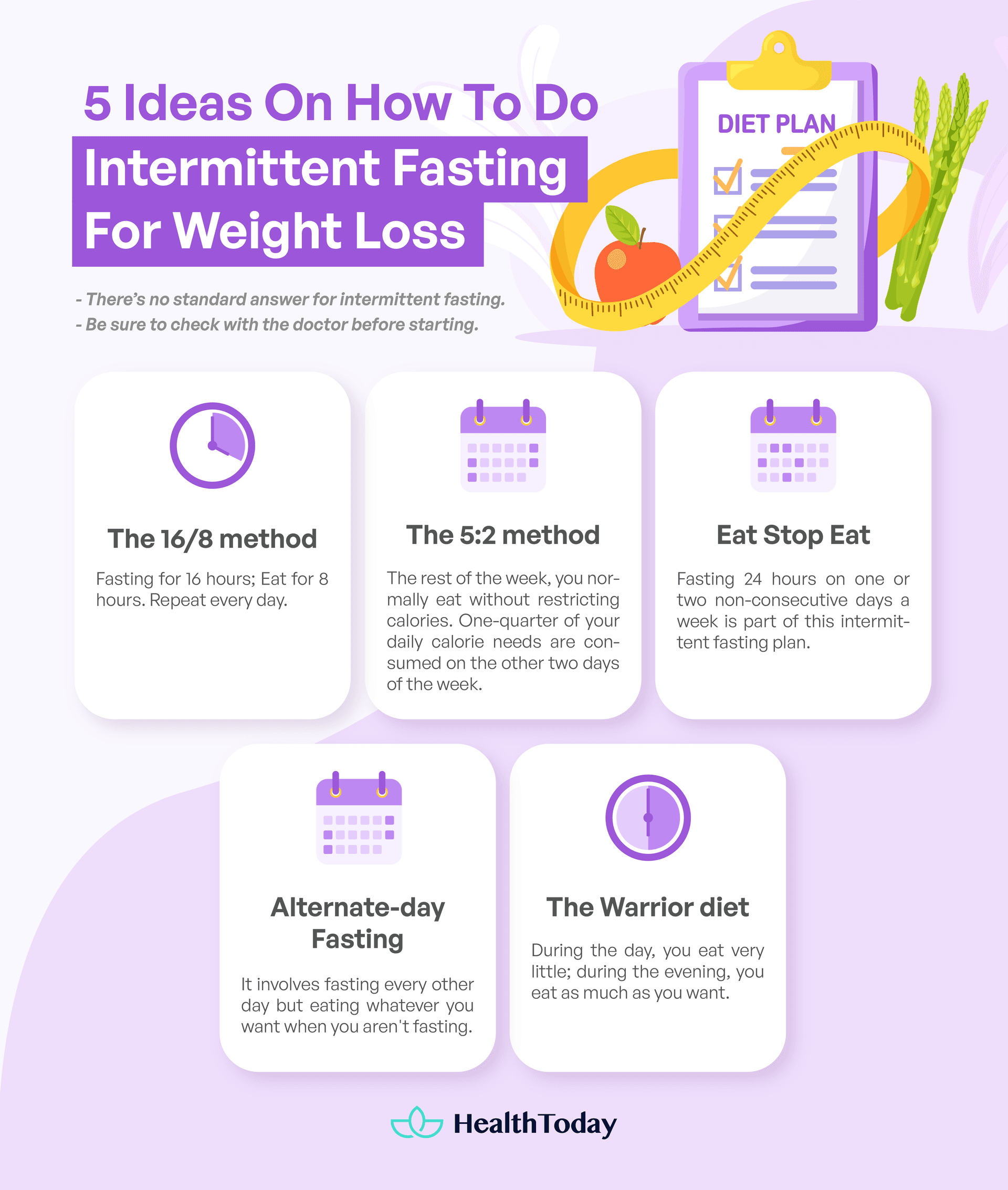Table of Contents
Does fasting for weight loss really work? Many people wonder whether skipping a meal or two is a bad idea. But what if fasting is the secret weapon for losing weight? For various reasons, a popular diet trend to emerge is Intermittent Fasting. There are various types of intermittent fasting schedules, so which one is the best for you? First, let’s find out if fasting works for weight loss and what the benefits of intermittent fasting could be for you.
What is intermittent fasting?
People who have done fasting, particularly for religious reasons, would know there are different set parameters. Fasting can be dry fasting, where no liquids are consumed, or fasting can include the consumption of water.
Essentially, a fasting period means you refrain from food and calorie-filled beverages for a particular time period. This is what happens when you sleep for eight hours, after which you break your fast and have breakfast!
With an intermittent fasting eating pattern, you condition the body to longer than normal non-eating, low or non-calorie eating windows. There are various ways to do this.
How fasting can help you lose weight
Fasting and weight loss work in two ways. One, fasting can limit the amount of calories you eat, and secondly, it can trigger faster fat burning (1).
When the body is starved of glucose from carbohydrates, fats, and proteins for a certain period of time, it enters into a state called nutritional ketosis. Ketosis triggers the body to burn fat in order to release a fuel known as ketones (2).
Other benefits of fasting
The effects of intermittent fasting over time have not been adequately researched, including long-term health risks. However, there are a number of associated health benefits to intermittent fasting other than weight loss:
- Regulation of metabolic processes (3).
- Improved blood sugar maintenance (4).
- Cardiovascular risk reduction (5).
- Adjunct treatment for multiple sclerosis (6).
5 Ways to do intermittent fasting and lose weight
An intermittent fasting schedule is about conditioning the body to stricter and longer periods of non-eating, restricted calorie, or non-calorie intake than usual. Here are 5 popular methods that have been used for intermittent fasting:

The 16:8 method
For this intermittent fasting method, you set a fixed 8-hour eating window for daily food consumption and beverages containing calories. During the remaining 16 hours, you should abstain from food or any calorie-containing drinks.
According to some research, time-restricted eating patterns can be used to reduce hunger. Also, it helps in preventing hypertension and diabetes (7, 8).
Specifically, in a 2016 study, the 16:8 method helped participants decrease fat mass and preserve muscle mass. This was particularly so when combined with resistance training (9, 10).
The 5:2 method
The 5:2 intermittent fasting method specifically targets calorie reduction. You eat well-balanced meals and in moderation for five days a week—basically normal eating. Then, on two days a week, you eat no more than 500 to 600 calories per day.
This means reducing calorie intake from 2,000 calories to 500 calories per day. That is the equivalent of a hearty breakfast and a snack or just one full meal per ‘fasting day’.
According to a 2018 study, the 5:2 diet has the same effect on weight loss and blood sugar control as daily calorie restriction. There are no directives for what or when to eat on full-calorie days, and you can pick the days for fasting periods (11).
Eat-stop-eat
Brad Pilon, author of the book “Eat Stop Eat,” popularized an unconventional approach to intermittent fasting (12).
It simply entails not taking in calories for 24 hours once or twice a week but on non-consecutive days. Eating days should be dedicated to well-balanced meals and eating in moderation. Eating fewer calories during eating windows can help reduce weight on fasting days.
More research is needed to determine whether the eat-stop-eat intermittent fasting pattern can help people lose weight and improve health.
Alternate-day fasting
Alternate-day fasting is a pretty straightforward intermittent fasting method. It involves fasting every other day—or eating one day and fasting the next. There are other restrictions on what and when you can eat.
Some variations let you eat around 500 calories on fasting days as part of a ‘modified’ fasting strategy, which is basically the 5:2 method again. In other versions, fasting days are completely calorie-free.
The warrior diet
The warrior diet is an adaptation of ancient warrior eating patterns developed by Ori Hofmekler in 2001. It’s a somewhat more extreme version of the 16:8 intermittent fasting pattern but allows for snacking during restricted window periods.
During the day, or within a 20-hour window, you should eat very little. If you eat, it should be light snacks such as raw fruit and vegetables, dairy, or eggs. During the evening, you eat as much as you want, which basically means one big meal per day.
Precautions for intermittent fasting
In general, you should avoid overeating during eating windows. Focus on a healthy diet with nutritionally dense foods such as fresh fruits, vegetables, whole grains, low-fat dairy, and lean protein. This will help prevent undernutrition.
Consuming fewer than 1200 calories per day for a prolonged period of time could result in malnutrition.
Dehydration can be an issue with fasting, but intermittent fasting generally does not restrict water or non-calorie drinks. Make sure to drink enough water during your fasting windows—with less food intake, you are also taking in less liquid into your body.
People who should avoid fasting or seek advice are:
- People under 18 years.
- Pregnant or breastfeeding women.
- People with a history of disordered eating.
- Those with eating disorders.
- Professional athletes.
- If you have diabetes or other medical issues.
Can intermittent fasting cause weight gain?
Fasting for weight loss involves restricting calorie intake for specific periods. As long as you don’t overindulge during eating windows and stick to well-balanced meals, it’s unlikely that you will gain weight. The key is to stick to a calorie deficit.
How much weight can you lose with intermittent fasting?
Studies have shown intermittent fasting can lead to a weight loss of up to 8% of body weight within a few weeks to months. If you maintain a calorie deficit and make healthy food choices, you can expect to lose an average of 1-2 pounds per week.
What to eat on intermittent fasting for weight loss?
Eat a balanced combination of lean protein, complex carbohydrates, and healthy fats. Foods like eggs, chicken, fish, vegetables, fruits, nuts, and seeds are ideal. Avoid processed and sugary foods, as they can spike insulin levels.
Why am I not losing weight on intermittent fasting?
The reasons could include consuming too many calories during your eating window, eating unhealthy foods, or not being in a calorie deficit. Stress, a lack of sleep, and underlying medical conditions could be other factors.
Why am I gaining weight on intermittent fasting?
The key reasons could be overeating during your eating window, eating high-calorie or processed foods, or not being in a calorie deficit. Additionally, certain medications, medical conditions, or hormonal issues can also contribute to weight gain.
Summary
There are different types of intermittent fasting. Most have not been studied in serious depth, so there is no guidance on choosing the most suitable method for any individual. For people in general, there are no known serious side effects. Regardless of the method you choose, it is best to focus on well-balanced and healthy meals during eating windows. Avoid overeating, and remember to stay hydrated during non-eating windows. Studies have shown positive weight loss results, as well as other health benefits to intermittent fasting.

















Comments
0